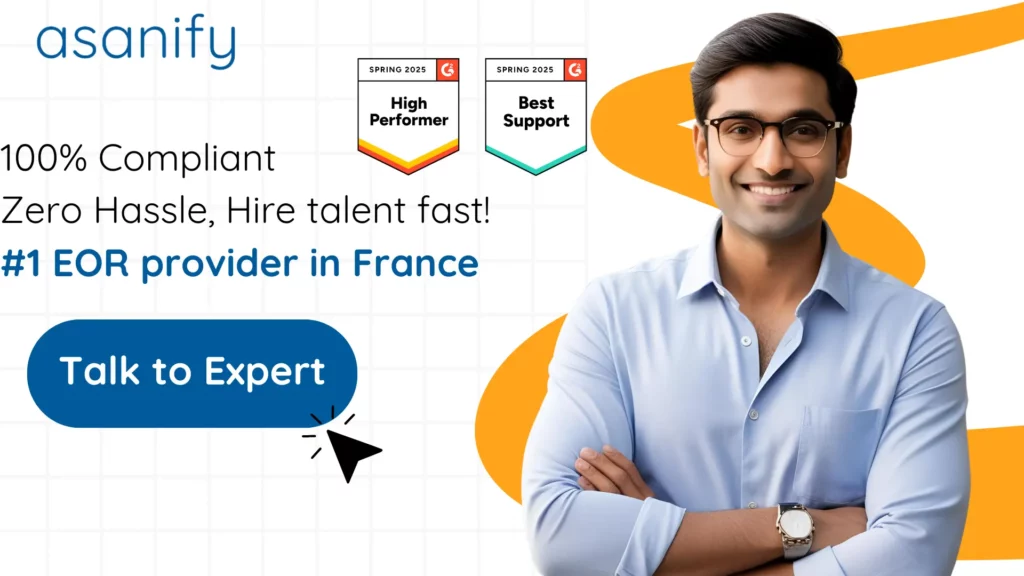Expanding your business into France offers access to one of Europe’s largest economies and a global hub for innovation, industry, and culture. However, before hiring in France, employers must understand the country’s work authorization process. Securing the correct work permit and visa in France for non-French employees is essential to staying compliant with immigration regulations and ensuring a smooth onboarding process.
Navigating these requirements can be complex, as they vary depending on the employee’s nationality, job role, and duration of employment. Employers must ensure all documentation is accurately prepared and submitted within the required timelines. Partnering with experts or an Employer of Record (EOR) can significantly streamline this process and reduce compliance risks.
Table of Contents
- Overview of France’s Work Permit and Visa System
- Understanding Requirements and Eligibility
- Types of Work Visas and Permits in France
- Comparing Work Permit Types
- Advantages of the Talent Passport
- Application Process for Employers
- Required Documents
- Processing Timelines
- Employer Responsibilities and Compliance
- Tips for a Smooth Application Process
- How an Employer of Record Can Help
- How Asanify Can Help
- FAQs
Overview of France’s Work Permit and Visa System
France has a well-structured system for managing foreign employment, which depends on the worker’s nationality and the duration of stay. While EU/EEA and Swiss citizens can work freely under EU freedom of movement laws, non-EU nationals must follow a formal process to obtain the necessary authorization.
Key points:
- EU/EEA/Swiss citizens – No work permit required due to free movement rights.
- Non-EU nationals – Must obtain a work permit before starting work.
- Centralized process – Applications are handled by the French Ministry of the Interior and local prefectures, often with employer initiation.
- Employer-driven applications – Employers usually secure work authorization before the employee applies for a visa.
- Two-step process – First, secure a work permit; second, apply for a long-stay visa (if required).
Understanding Requirements and Eligibility
Before starting the application process, both employers and employees must be familiar with France’s immigration rules. EU/EEA and Swiss nationals can work without restrictions, while non-EU nationals require a specific work permit or long-stay visa for employment purposes. Requirements can vary depending on the job type, the worker’s qualifications, and the region of employment.
Who Needs a Work Permit in France
Most non-EU/EEA/Swiss nationals must hold a valid work permit to be employed in France. Citizens of EEA countries and Switzerland do not require work authorization due to EU labor mobility rights. For all other foreign nationals, the employer must obtain authorization before the employee begins work.
Key Conditions for Obtaining a Work Visa
To qualify for a French work visa, foreign nationals must generally:
- Have a confirmed job offer from a France-based employer
- Show proof of relevant qualifications or professional experience
- Possess valid health insurance
- Maintain a clean criminal record
Employer and Employee Eligibility
Employers may need to prove that the position cannot easily be filled by a French or EU candidate—particularly for certain permit types. Employees must meet role-specific criteria, which may vary depending on the industry and location.

Types of Work Visas and Permits in France
France offers several work authorization pathways based on skill level, job type, and length of stay. Common options include:
- Temporary Worker Permit (Salarié Temporaire) – For fixed-term employment contracts.
- Skilled Employee Permit (Salarié Qualifié) – For long-term employment in skilled positions.
- Talent Passport – For highly skilled professionals, researchers, and investors.
- Seasonal Worker Permit (Travailleur Saisonnier) – For temporary, seasonal work in industries such as agriculture or tourism.
Suggested Read: Understanding Labour Laws in France
Comparing Work Permit Types
| Permit Type | Purpose | Duration | Notes |
| Temporary Worker Permit | Fixed-term employment | Contract duration | Requires employer sponsorship |
| Skilled Employee Permit | Long-term skilled work | 1–3 years | Renewable |
| Talent Passport | Highly skilled or specialized work | Up to 4 years | Streamlined process for certain profiles |
| Seasonal Worker Permit | Temporary seasonal jobs | Up to 6 months/year | Renewable annually |
Advantages of the Talent Passport
Introduced to attract high-value talent, the Talent Passport allows qualified professionals, entrepreneurs, researchers, and investors to work and reside in France with fewer administrative hurdles. It covers multiple professional categories, provides longer validity periods, and simplifies family reunification procedures.
Application Process for Employers
The process begins when an employer extends a formal job offer to a foreign candidate. The employer then submits a work authorization request to the French labor authorities (DIRECCTE). Once approved, the file is forwarded to the French Immigration Office (OFII). The employee then applies for the corresponding long-stay visa at a French consulate in their home country.
Required Documents
Applications typically require:
- A signed employment contract approved by the labor authorities
- Copy of the employee’s passport
- Proof of qualifications or relevant work experience
- Justification for hiring a foreign worker (if applicable)
- Health insurance documentation

Processing Timelines
Work permit processing in France generally takes 4–12 weeks, depending on the type of permit, the job role, and the completeness of the application. Talent Passport applications often have faster processing compared to standard work permits.
- Processing timelines may vary based on the applicant’s nationality and the urgency of the hiring need.
- Incomplete or incorrect applications can cause significant delays in approval.
- Sector-specific permits (e.g., for IT, healthcare, or engineering) may have different requirements and timelines.
- Coordination with both employer and employee is essential to avoid gaps in documentation.
- Use of an EOR or immigration specialist can help ensure accurate submission and faster approval.
Employer Responsibilities and Compliance
Employers must ensure that all foreign hires are legally authorized to work in France. This includes offering contracts that meet French labor standards, paying salaries in accordance with legal minimums or industry agreements, and maintaining accurate employee records. Monitoring work permit validity and initiating timely renewals are essential to avoid penalties.
Legal Obligations
Employers sponsoring foreign workers must:
- Provide compliant employment contracts
- Pay salaries meeting or exceeding French legal thresholds
- Keep detailed employee work status records
- Renew permits before expiration
Consequences of Non-Compliance
Failure to follow immigration and labor laws can result in:
- Significant fines
- Criminal charges in severe cases
- Reputational damage and hiring restrictions
Maintaining Ongoing Compliance
- Conduct regular internal audits of employee permits
- Keep HR teams updated on immigration law changes
- Use tracking systems for permit and visa expiry dates
Tips for a Smooth Application Process
- Start the application early to account for possible delays
- Double-check documentation requirements for your permit type
- Be aware of regional and industry-specific rules
- Consider professional assistance from an Employer of Record or immigration lawyer

How an Employer of Record Can Help
Partnering with an Employer of Record in France allows companies to legally employ foreign talent without setting up a local entity. The EOR becomes the legal employer, handling payroll, benefits, HR compliance, and immigration processes. This reduces administrative burdens, speeds up hiring, and ensures full compliance with French regulations.
Additionally, EOR providers manage employment contracts in line with French labor laws, minimizing the risk of legal disputes. They also assist with work permit and visa applications, ensuring smooth onboarding for international employees. By leveraging an EOR, businesses can focus on operations and growth while leaving complex employment compliance in expert hands.
Suggested Read: Remote Employees Onboarding Checklist with EOR in France
How Asanify Can Help
Navigating France’s work authorization process can be complex, especially for businesses hiring internationally. Asanify provides an all-inclusive Employer of Record (EOR) solution that simplifies hiring and workforce management in France.
Our services include everything from obtaining the right permits to managing payroll and benefits—ensuring you remain compliant with French labor laws without setting up a legal entity.
With Asanify, you can:
- Hire and onboard foreign talent quickly without administrative delays
- Ensure compliance with all regional labor and immigration regulations
- Expand into France without the cost and complexity of creating a local company
If your objective is to grow your team in France efficiently, Asanify’s expertise and end-to-end services make the process seamless.
FAQs
Most work visas are valid for 1–4 years, depending on the permit type, and can be renewed.
Fees range from €200–€400, excluding legal or consultancy costs.
Yes, but they must still hold valid residence and work authorization.
It is a streamlined permit for highly skilled professionals, entrepreneurs, and researchers who meet salary and qualification requirements.
Long-term permits like the Talent Passport and Skilled Employee Permit also provide residence rights.
Yes, Talent Passports are often processed faster than standard work permits.
Yes, most long-term permits allow family reunification.
The employee must stop working until a renewal is granted.
In many cases, yes—especially for standard work permits that require labor market testing.
An EOR manages compliance, payroll, and immigration, enabling companies to focus on business growth without legal risk.
Not to be considered as tax, legal, financial or HR advice. Regulations change over time so please consult a lawyer, accountant or Labour Law expert for specific guidance.

